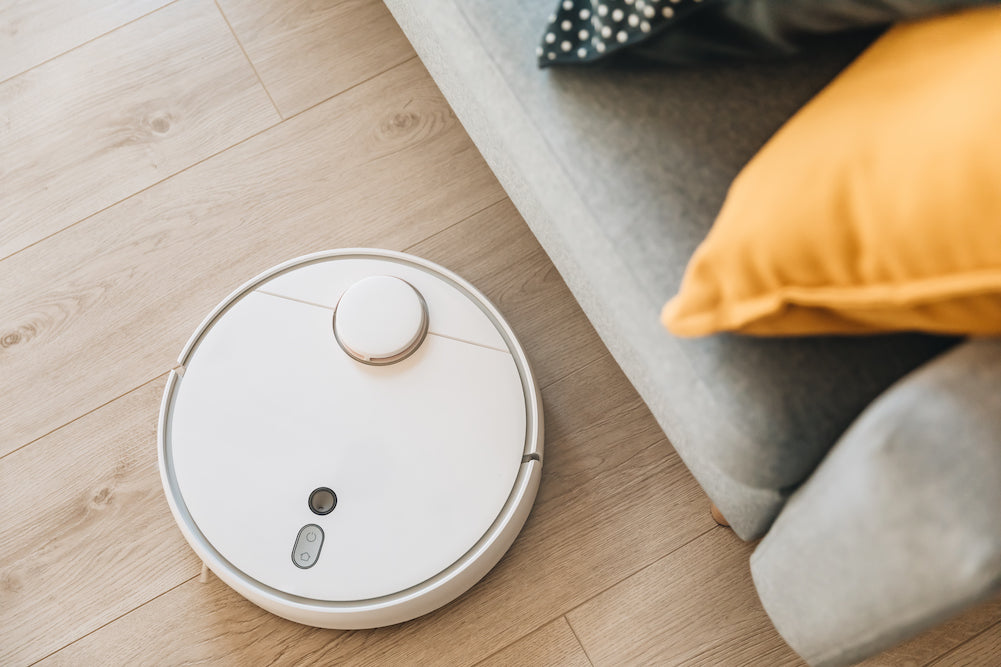
Embracing Sustainability: The Energy Efficiency of Smart Vacuums

Sustainability has become a pressing concern, and our choices regarding household appliances significantly reduce our environmental impact. Smart vacuums have gained popularity in recent years with their advanced features and cutting-edge technology. In this blog post, we'll delve into the concept of energy efficiency in smart vacuums and explore how they contribute to a more sustainable lifestyle.
Energy Efficiency Features
Smart vacuums are designed with energy efficiency in mind, offering a range of features to optimize their energy consumption. By incorporating power-saving modes, adaptive cleaning technology, and smart scheduling capabilities, these vacuums strive to minimize their environmental footprint while still delivering exceptional cleaning performance. Power ratings are carefully tailored to ensure efficient energy utilization, and the ability to adjust suction power based on floor type and dirt level further enhances energy efficiency. These features collectively reduce energy consumption compared to their traditional counterparts.
Environmental Benefits
The environmental benefits of smart vacuums extend beyond energy efficiency. By reducing energy consumption, these devices contribute to lower greenhouse gas emissions, vital in combating climate change. Additionally, their efficient cleaning practices conserve resources such as water and cleaning agents. Innovative technologies, such as HEPA filters and cyclonic separation, ensure thorough cleaning while reducing the need for harsh chemicals. These eco-friendly cleaning practices benefit the environment and create healthier indoor air quality for inhabitants.
Sustainability Considerations
Sustainability is a holistic concept that encompasses the entire lifecycle of a product. When it comes to smart vacuums, manufacturers consider various aspects to minimize their environmental impact. Sustainable manufacturing processes are employed, such as reducing energy usage during production and incorporating eco-friendly materials. Smart vacuum designs prioritize recyclability, with manufacturers aiming to use materials easily disassembled and recycled at the end of the vacuum's life.
Additionally, emphasis is placed on creating durable and long-lasting products, reducing the frequency of replacements, and minimizing waste generation. By opting for smart vacuums with eco-friendly certifications or labels, consumers can make choices aligned with sustainability goals.
User Practices for Enhanced Sustainability
While smart vacuums come packed with energy-efficient features, users can also adopt practices to enhance sustainability further. Optimal usage patterns, such as cleaning in shorter sessions and focusing on high-traffic areas, ensure efficient energy utilization. By cleaning in shorter bursts, users minimize energy consumption and maximize the effectiveness of the cleaning process.
Furthermore, scheduling cleaning sessions during off-peak electricity hours can contribute to energy conservation. Proper maintenance, including regular filter cleaning and brush maintenance, improves performance and extends the vacuum's lifespan, reducing waste generated from frequent replacements.
Additionally, users can explore opportunities to repurpose or donate older vacuum models instead of discarding them, contributing to the circular economy and reducing electronic waste.
Industry Efforts and Innovation
The industry is actively striving to enhance sustainability through research and development. Manufacturers invest in sustainable vacuum technologies, explore eco-friendly materials, and collaborate with environmental organizations. Energy storage advancements, integration of renewable power sources, and advanced efficiency algorithms are key areas of innovation.
Manufacturers are working towards improving battery technology to prolong runtimes and reduce the need for frequent recharging. By integrating renewable energy sources into the charging process, smart vacuums can become more eco-friendly. Advanced efficiency algorithms ensure that energy is utilized optimally during cleaning, resulting in a more sustainable operation. These collective efforts are driving the evolution of smart vacuums toward greater sustainability.
Consumer Awareness and Decision-Making
As responsible consumers, it is crucial to be aware of the energy efficiency and sustainability aspects when purchasing a smart vacuum. We can identify energy-saving features by reading product labels and specifications and comparing energy consumption ratings. Look for certifications such as ENERGY STAR, which assure sustainable performance. Conducting thorough research on smart vacuum models and brands can help uncover their commitment to sustainability and eco-friendly practices. Online reviews and customer experiences can also provide valuable insights into the durability, energy efficiency, and overall sustainability of specific models.
Aligning our purchasing decisions with personal sustainability goals fosters a culture of conscious consumption and encourages manufacturers to prioritize eco-friendly practices. By choosing energy-efficient smart vacuums, we actively contribute to reducing our carbon footprint and promoting a greener future.
Final Thoughts
Incorporating energy-efficient smart vacuums into our households offers significant environmental benefits. With their energy-saving features, advanced cleaning capabilities, and commitment to sustainability, these devices are a step towards a greener future. By embracing energy efficiency, making informed choices, and adopting sustainable practices, we can contribute to a cleaner planet while maintaining a clean and tidy home.
As consumers, we have the power to drive positive change by supporting manufacturers that prioritize sustainability and energy efficiency in their smart vacuum designs. By understanding the environmental benefits of these devices, implementing optimal usage practices, and considering the lifecycle impact of our purchasing decisions, we can make a meaningful difference. Let's embrace sustainability and harness the power of energy-efficient smart vacuums to create a more sustainable and environmentally conscious lifestyle.
You might like
Meet the ultimate cleaning trio: iRobot Roomba i3 EVO, roborock Q5, and eufy BoostIQ RoboVac 11S MAX. With strong suction and smart features, these robot vacuum cleaners effortlessly tackle dirt on different surfaces.

